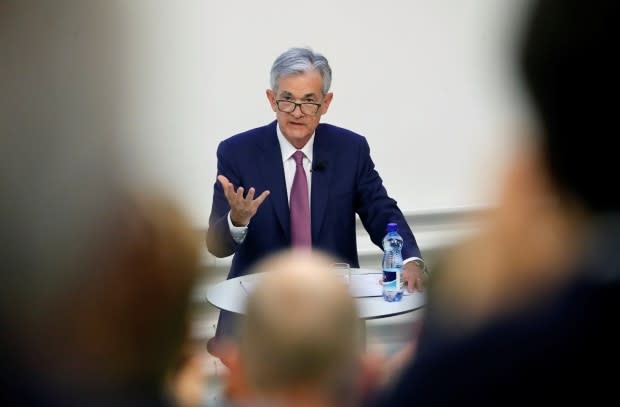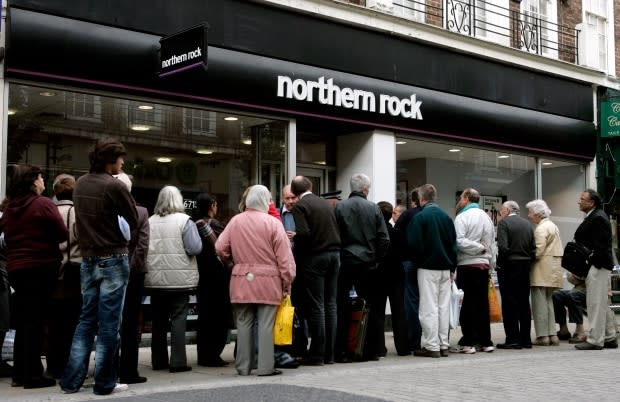Name calling and market pressure may curb U.S. Fed's independence: Don Pittis
With last week's declaration that the very smart people at the Federal Reserve are "boneheads," U.S. President Donald Trump has become perhaps the world's highest profile prognosticator of a North American crisis.
The irony of the insult notwithstanding, Trump's demands that the "Federal Reserve should get our interest rates down to ZERO or less" seem to indicate the president thinks a weakening U.S. economy needs powerful medicine.
As Federal Reserve chair Jerome Powell and his team of advisers make their rate decision this week it is hard to be sure whether, or how much, a decision to cut rates will be influenced by outside pressure.
On purely economic grounds, the Fed may see reasons to leave rates unchanged. But despite their official independence, political directives and market expectations are telling the Federal Open Market Committee, who make the final rate decision, that their hands are tied.
According to most economists, low and negative interest rates of the kind Trump advised are a special tool reserved for dire circumstances.
When central banks slashed rates in the aftermath of the 2007-08 credit crunch they were widely applauded. But the idea that something similar is happening now would be terrifying. That is, if we believed it.

Puzzling out the true meaning of the president's tweets is never easy. Perhaps it is a madcap idea to satisfy his base. Or it's just another way of feathering his own nest, a standard Democratic complaint.
Certainly low rates help property companies with large loans and tend to help rich people with assets such as real estate and stock.
The level-headed folks at the FOMC will know that whatever rational arguments there may be for rate cuts, there are many, many reasons to wait as data pours in showing the economy is nowhere near collapse and recession.
On Friday U.S. retail sales surged at double the rate economists had predicted. The producer price index, a sign of industrial strength, surprised everyone with an August rise. Unemployment still hovers at historic lows.
The single biggest fear for the U.S. economy has been its trade war with China, and last week there was clear evidence that both sides are taking steps back from the brink.
Firing national security adviser John Bolton, seen as the Trump administration's most hawkish hawk, may offer economic dividends and draws the U.S. back from economically destabilizing regional conflicts.
Inflation is not dead
"In the world's hot spots from Iran to North Korea — and even among allies — some see opportunity in President Donald Trump's firing of his national security adviser," reported Associated Press last week. Of course all bets are off following the weekend attacks on Saudi oil production that some U.S. officials have blamed on Iran, something that country has denied.
Perhaps most significant for the Fed, whose two prime mandates are to boost employment and keep inflation under control, were numbers last week showing inflation is not dead after all.
While the headline price level was up only slightly, core inflation, the measure chopping out volatile goods such as energy, was well above target at 2.4 per cent, and higher than market expectations. Gas prices that have been holding inflation down may be set to soar following the Saturday attack, which is expected to cause a major drop in Saudi oil output.
The surge is a warning and a reminder that at some point the Fed will again have to raise rates. Surely FOMC members will not forget the theatrical wailing from markets last time the Fed felt forced to hike rates to fight inflation. Perhaps the memory will give them second thoughts about making cuts that might have to be reversed.
The other strong technical argument for refusing to cut rates frivolously is that the bank is wasting fire power for when a recession actually hits. If Powell follows Trump's advice and cuts when the U.S. economy is strong, the FOMC must show what tools they will use once it is not.

In a time when politicians seem willing to say anything to get what they want, perhaps most important is Powell's stature as someone who can be trusted to reach conclusions based strictly on evidence.
Speaking in a British context, last week Canadian author Margaret Atwood described a growing medievalism where politicians who disagree with their mad king fear they will be next on the chopping block.
Being subject to Congress, not the administration, means that Powell has the freedom to contradict Trump and declare that the U.S. economy is vibrant and strong. In what Princeton economist Robert Shiller has described as "narrative economics," Powell may have the power to shift the narrative.
If he agrees with Trump and others who claim a weakened United States needs rate cuts, consumers and businesses are more likely to believe him than Trump, whose interests are opaque.
But if Powell can honestly tell investors and consumers that a strong U.S. is not showing signs of recession and does not need lower interest rates, that a young and vigorous workforce hired by innovative companies still has room to grow, invest and prosper, he may be able to boost the North American economy far more than he could with a quarter or even a half percentage point cut in rates.
Follow Don on Twitter @don_pittis


